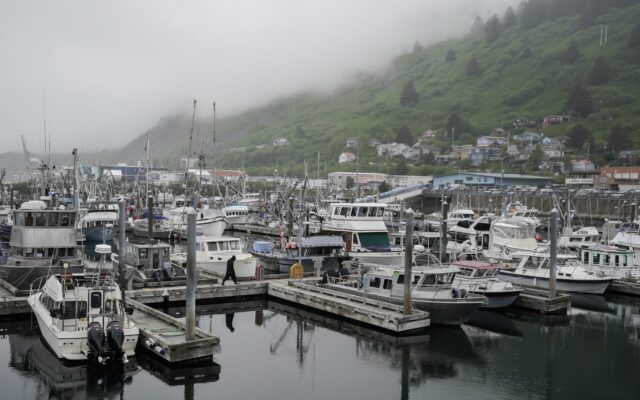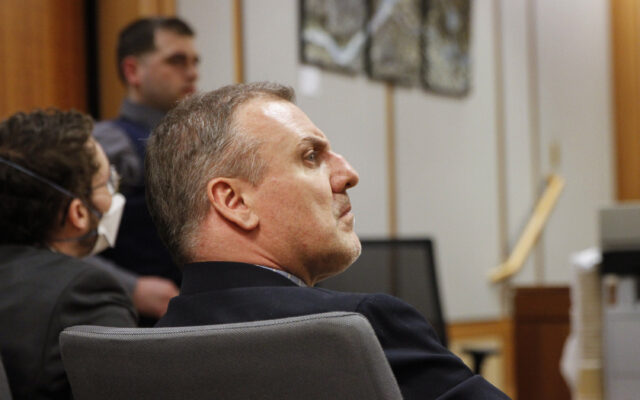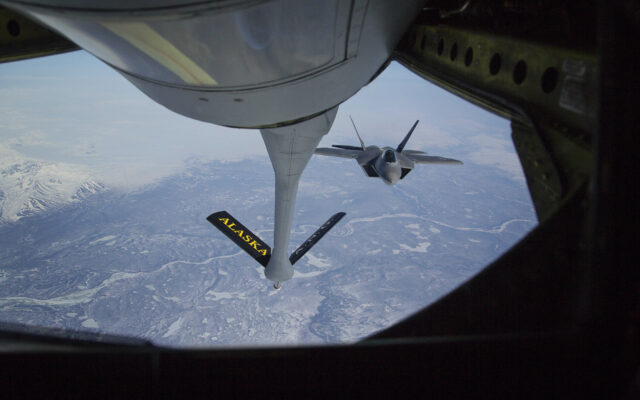Alaska fishers fear another bleak season as crab populations dwindle in warming waters

KODIAK, Alaska (AP) — Gabriel Prout worked four seasons on his father’s crab boat, the Silver Spray, before joining his two brothers in 2020 to buy a half-interest plus access rights for a snow crab fishery that’s typically the largest and richest in the Bering Sea. Then in 2021, disaster: an annual survey found crabs crashing to an all-time low. The red king crab fishery was closed; the snow crab fishery cut to a tenth of the previous year’s take.
After another bad survey last year, the red king crab fishery closed again and the snow crab fishery closed for the first time ever. Suddenly, Prout’s optimism about being his family’s third generation in crab fishing seemed misplaced.
“It’s very hard to find a way to keep going forward,” said Prout, 33. With almost all his expected income gone, he’s scrambled ever since to scratch out a living by working as a salmon tender — using his boat to supply other boats and offload their catch.
Researchers are scrambling to understand crabs’ collapse, with seas warmed by climate change as one theory. Preliminary data from this year’s survey suggest another year of closed or severely limited fisheries, with decisions on crab catch limits expected in early October shortly before the season traditionally opens.
Kevin Abena, who runs a fishing business with his father, also relies on tendering to stay afloat in the wake of the crab fishery closure. His vessel Big Blue, which his father built in the late 1970s, stopped fishing for most crab in Bristol Bay in 2010, but they still own access rights and take a percentage from other boats that fish their quota. Abena also fishes for halibut and black cod.
His income has dropped by about 20%, he said. He sympathizes with the larger hit taken by owners of boats with rights only for crab.
“That’s rent, that’s mortgages, that’s everything in life,” he said.
Abena, a board member of the Kodiak Crab Alliance Cooperative, said he’s seen the competition increase for tendering and for access to other fisheries. He noticed more boats going after tanner crab last season — a much smaller fishery, but one that was open.
When fisheries get closed “you displace a lot of boats and a lot of crew,” he said. “It makes people start hunting for more opportunity.”
But not all boats can adapt quickly to work in another fishery. Different equipment is often needed and access rights are necessary, both costly investments.
Scientists say two years of low sea ice cover and abnormally warm ocean temperatures due to climate change in 2018 and 2019 may have altered the ecosystem in a way that snow crab couldn’t survive, said Mike Litzow, lab director at the Kodiak Fisheries Science Center. Their annual survey, which was skipped in 2020 due to COVID, found total crab populations in the Bering Sea plummeted from an all-time high of 11.7 billion in 2018 to 940 million in 2021, the lowest ever recorded.
Researchers this year brought samples of crab back to Kodiak for further analysis, exploring how snow crab respond to stress in their environment, including rising heat.
Snow crab are typically found in a cold pool — water in the Bering Sea that stays below 35.6 degrees Fahrenheit (2 degrees Celsius) throughout the year. Researchers have found these crab can survive in water warmer than this, leading them to speculate that rising ocean temperatures alone aren’t to blame for the collapse. Instead, researchers think the warmer water may have allowed more predators into the habitat, facilitated disease spread or made it harder for the crabs to catch enough prey to fuel an increased metabolism.
“They’re an Arctic animal,” Litzow said. “Longer term, what we expect is that the fish will be moving farther north as those Arctic characteristics recede in the Bering Sea.”
Researchers and managers have started examining data from this year’s survey. It will help determine what crab fisheries might open this winter and decisions on each kind of crab are expected some time in early October.
“We were making a prediction last year about outcomes for this year and I think we are more right than wrong,” said Mark Stichert, the groundfish and shellfish fisheries coordinator for the Alaska Department of Fish and Game. “We think things are going to get worse before they get better.”
Some fishers have questioned why trawl boats, which use large nets to catch a variety of fish, are still being allowed to operate. They also say the trawl nets can damage crab habitat by dragging across the bottom of the ocean.
After last year’s closures the Alaska Bering Sea Crabbers, a nonprofit trade association that Prout leads, petitioned the National Marine Fisheries Service to close fishing of all types for 180 days in an eastern part of the Bering Sea in an effort to protect the red king crab there. That request was denied in late January.
A 2022 study from the National Marine Fisheries Service and the North Pacific Fishery Management Council looked at potential reasons for the decline of the Bristol Bay Red King Crab stock and found that contact on the ocean floor from midwater trawl nets had some impact on that stock. The study also estimated that some of these trawl nets could have contacted the ocean floor at least 80% of the time they were in the water, but concluded that trawling alone isn’t the cause of the continued decline in that red king crab stock.
Abena and others are more direct in their criticism.
“You rig a trawl net and drag it across the bottom of ocean and mow a bunch of crab over, you’re not helping that stock at all, you’re killing crab,” Abena said.
In May, the U.S. Department of Commerce allocated almost $192 million to help Alaska fishers affected by the closures of the king and snow crab fisheries for the last two years, but Prout thinks many boats will go out of business before that money arrives.
Prout hopes his family can weather a potential closure, but he’s already mulling ways to earn money this year outside of fishing.
Staying on shore, though, is not in his nature.
“It’s kind of sad because you go down to the boat harbor and the boats are all just tied up sitting there and they should be working,” Prout said. “It’d be great if they came back and said ‘Hey, we found a ton of snow crab,’ but I don’t think that’ll happen.”
You Might Also Like



